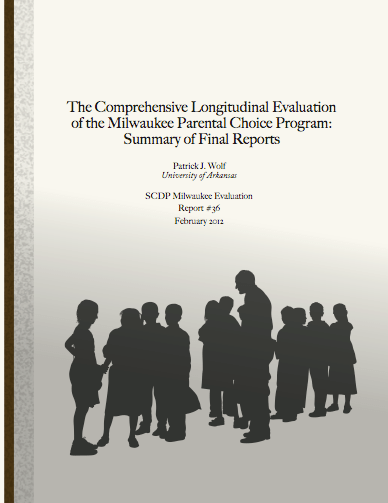 Five years and thirty-six reports later, the
researchers at the University of Arkansas’s School Choice Demonstration Project
have written their last word on Milwaukee’s Parental Choice Program (MPCP)
(some background here
and here).
Largely, the news is good for the nation’s oldest school-voucher enterprise.
Eight new studies—written by Patrick Wolf, John Witte, Anna Jacob, and others—make
plain that voucher students were more likely to graduate high school and enroll
in a four-year college than their counterparts in the Milwaukee Public Schools
(MPS). Voucher pupils also made significantly larger reading gains. Perhaps
most tantalizing, the state’s new school-accountability requirements seem
partly responsible for the progress. In 2010-11, the final year of data
collection, MPCP students made significantly larger reading gains than their
MPS peers—unlike previous years, when voucher students were merely on par with
their public-school counterparts. (Achievement growth in math was about the
same for MPCP and MPS students throughout the studied years.) Interestingly,
the same year saw a host of additional testing and reporting regulations added
to participating voucher schools. For example, voucher-bearing pupils had to
take state assessments and their schools had to adopt formal graduation and
promotion standards. Though analysts couldn’t “determine conclusively how big a
role the accountability policy played,” their findings encourage the view that
voucher programs shouldn’t be ruled by the market alone; transparency and
results-based accountability are good for everyone.
Five years and thirty-six reports later, the
researchers at the University of Arkansas’s School Choice Demonstration Project
have written their last word on Milwaukee’s Parental Choice Program (MPCP)
(some background here
and here).
Largely, the news is good for the nation’s oldest school-voucher enterprise.
Eight new studies—written by Patrick Wolf, John Witte, Anna Jacob, and others—make
plain that voucher students were more likely to graduate high school and enroll
in a four-year college than their counterparts in the Milwaukee Public Schools
(MPS). Voucher pupils also made significantly larger reading gains. Perhaps
most tantalizing, the state’s new school-accountability requirements seem
partly responsible for the progress. In 2010-11, the final year of data
collection, MPCP students made significantly larger reading gains than their
MPS peers—unlike previous years, when voucher students were merely on par with
their public-school counterparts. (Achievement growth in math was about the
same for MPCP and MPS students throughout the studied years.) Interestingly,
the same year saw a host of additional testing and reporting regulations added
to participating voucher schools. For example, voucher-bearing pupils had to
take state assessments and their schools had to adopt formal graduation and
promotion standards. Though analysts couldn’t “determine conclusively how big a
role the accountability policy played,” their findings encourage the view that
voucher programs shouldn’t be ruled by the market alone; transparency and
results-based accountability are good for everyone.
School Choice Demonstration Project, Milwaukee Evaluation: Final Reports (Fayetteville, AR: University of Arkansas, February 2012).
